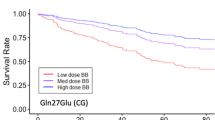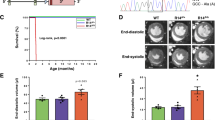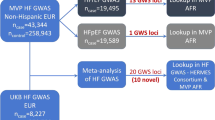Abstract
β-adrenergic receptor (βAR) blockade is a standard therapy for cardiac failure and ischemia. G protein–coupled receptor kinases (GRKs) desensitize βARs, suggesting that genetic GRK variants might modify outcomes in these syndromes. Re-sequencing of GRK2 and GRK5 revealed a nonsynonymous polymorphism of GRK5, common in African Americans, in which leucine is substituted for glutamine at position 41. GRK5-Leu41 uncoupled isoproterenol-stimulated responses more effectively than did GRK5-Gln41 in transfected cells and transgenic mice, and, like pharmacological βAR blockade, GRK5-Leu41 protected against experimental catecholamine-induced cardiomyopathy. Human association studies showed a pharmacogenomic interaction between GRK5-Leu41 and β-blocker treatment, in which the presence of the GRK5-Leu41 polymorphism was associated with decreased mortality in African Americans with heart failure or cardiac ischemia. In 375 prospectively followed African-American subjects with heart failure, GRK5-Leu41 protected against death or cardiac transplantation. Enhanced βAR desensitization of excessive catecholamine signaling by GRK5-Leu41 provides a 'genetic β-blockade' that improves survival in African Americans with heart failure, suggesting a reason for conflicting results of β-blocker clinical trials in this population.
This is a preview of subscription content, access via your institution
Access options
Subscribe to this journal
Receive 12 print issues and online access
$209.00 per year
only $17.42 per issue
Buy this article
- Purchase on Springer Link
- Instant access to full article PDF
Prices may be subject to local taxes which are calculated during checkout



Similar content being viewed by others
References
Levy, D. et al. Long-term trends in the incidence of and survival with heart failure. N. Engl. J. Med. 347, 1397–1402 (2002).
Roger, V.L. et al. Trends in heart failure incidence and survival in a community-based population. J. Am. Med. Assoc. 292, 344–350 (2004).
Franz, W.M., Muller, O.J. & Katus, H.A. Cardiomyopathies: from genetics to the prospect of treatment. Lancet 358, 1627–1637 (2001).
The Merit HF Investigators. Effect of metoprolol CR/XL in chronic heart failure: Metoprolol CR/XL Randomised Intervention Trial in Congestive Heart Failure (MERIT-HF). Lancet 353, 2001–2007 (1999).
The β-Blocker Evaluation of Survival Trial Investigators. A trial of the β-blocker bucindolol in patients with advanced chronic heart failure. N. Engl. J. Med. 344, 1659–1667 (2001).
van Campen, L.C., Visser, F.C. & Visser, C.A. Ejection fraction improvement by β-blocker treatment in patients with heart failure: an analysis of studies published in the literature. J. Cardiovasc. Pharmacol. 32 (suppl. 1), S31–S35 (1998).
Wagoner, L.E. et al. Polymorphisms of the β2-adrenergic receptor determine exercise capacity in patients with heart failure. Circ. Res. 86, 834–840 (2000).
Liggett, S.B. Pharmacogenetic applications of the Human Genome project. Nat. Med. 7, 281–283 (2001).
Kohout, T.A. & Lefkowitz, R.J. Regulation of G protein–coupled receptor kinases and arrestins during receptor desensitization. Mol. Pharmacol. 63, 9–18 (2003).
Koch, W.J. et al. Cardiac function in mice overexpressing the β-adrenergic receptor kinase or a β ARK inhibitor. Science 268, 1350–1353 (1995).
Koch, W.J. Genetic and phenotypic targeting of β-adrenergic signaling in heart failure. Mol. Cell. Biochem. 263, 5–9 (2004).
Matkovich, S.J. et al. Cardiac-specific ablation of G protein–receptor kinase 2 redefines its roles in heart development and β-adrenergic signaling. Circ. Res. 99, 996–1003 (2006).
Premont, R.T., Koch, W.J., Inglese, J. & Lefkowitz, R.J. Identification, purification, and characterization of GRK5, a member of the family of G protein–coupled receptor kinases. J. Biol. Chem. 269, 6832–6841 (1994).
Gainetdinov, R.R. et al. Muscarinic supersensitivity and impaired receptor desensitization in G protein–coupled receptor kinase 5–deficient mice. Neuron 24, 1029–1036 (1999).
Chen, E.P., Bittner, H.B., Akhter, S.A., Koch, W.J. & Davis, R.D. Myocardial function in hearts with transgenic overexpression of the G protein–coupled receptor kinase 5. Ann. Thorac. Surg. 71, 1320–1324 (2001).
Rockman, H.A. et al. Receptor-specific in vivo desensitization by the G protein–coupled receptor kinase-5 in transgenic mice. Proc. Natl. Acad. Sci. USA 93, 9954–9959 (1996).
Ungerer, M., Bohm, M., Elce, J.S., Erdmann, E. & Lohse, M.J. Altered expression of β-adrenergic receptor kinase and β1-adrenergic receptors in the failing human heart. Circulation 87, 454–463 (1993).
Ungerer, M. et al. Expression of β-arrestins and β-adrenergic receptor kinases in the failing human heart. Circ. Res. 74, 206–213 (1994).
Oyama, N. et al. Angiotensin converting enzyme inhibitors attenuated the expression of G protein–coupled receptor kinases in heart failure patients. Circ. J. 70, 362–363 (2006).
Dzimiri, N., Basco, C., Moorji, A., Afrane, B. & Al Halees, Z. Characterization of lymphocyte β2-adrenoceptor signalling in patients with left ventricular volume overload disease. Clin. Exp. Pharmacol. Physiol. 29, 181–188 (2002).
Liggett, S.B. et al. Early and delayed consequences of β2-adrenergic receptor overexpression in mouse hearts: critical role for expression level. Circulation 101, 1707–1714 (2000).
Asai, K. et al. β-adrenergic receptor blockade arrests myocyte damage and preserves cardiac function in the transgenic Gsα mouse. J. Clin. Invest. 104, 551–558 (1999).
Okumura, S. et al. Disruption of type 5 adenylyl cyclase gene preserves cardiac function against pressure overload. Proc. Natl. Acad. Sci. USA 100, 9986–9990 (2003).
Bristow, M.R. β-adrenergic receptor blockade in chronic heart failure. Circulation 101, 558–569 (2000).
Packer, M. Current role of β-adrenergic blockers in the management of chronic heart failure. Am. J. Med. 110 (suppl. 7A), 81S–94S (2001).
Waagstein, F. et al. Beneficial effects of metoprolol in idiopathic dilated cardiomyopathy. Metoprolol in Dilated Cardiomyopathy (MDC) Trial Study Group. Lancet 342, 1441–1446 (1993).
Liggett, S.B. et al. A polymorphism within a conserved β1-adrenergic receptor motif alters cardiac function and β-blocker response in human heart failure. Proc. Natl. Acad. Sci. USA 103, 11288–11293 (2006).
Small, K.M., Wagoner, L.E., Levin, A.M., Kardia, S.L. & Liggett, S.B. Synergistic polymorphisms of β1- and α2C-adrenergic receptors and the risk of congestive heart failure. N. Engl. J. Med. 347, 1135–1142 (2002).
Barnholtz-Sloan, J.S., Chakraborty, R., Sellers, T.A. & Schwartz, A.G. Examining population stratification via individual ancestry estimates versus self-reported race. Cancer Epidemiol. Biomarkers Prev. 14, 1545–1551 (2005).
Pritchard, J.K., Stephens, M. & Donnelly, P. Inference of population structure using multilocus genotype data. Genetics 155, 945–959 (2000).
Bechhoffer, R.E., Kiefer, J. & Sobel, M. Sequential Identification and Ranking Procedures (University of Chicago Press, Chicago, 1986).
Liggett, S.B. β-adrenergic receptors in the failing heart: the good, the bad, and the unknown. J. Clin. Invest. 107, 947–948 (2001).
Lloyd-Jones, D.M. et al. Lifetime risk for developing congestive heart failure: the Framingham Heart Study. Circulation 106, 3068–3072 (2002).
Thom, T. et al. Heart disease and stroke statistics—2006 update: a report from the American Heart Association Statistics Committee and Stroke Statistics Subcommittee. Circulation 113, e85–e151 (2006).
Kim, J. et al. Functional antagonism of different G protein–coupled receptor kinases for β-arrestin–mediated angiotensin II receptor signaling. Proc. Natl. Acad. Sci. USA 102, 1442–1447 (2005).
Port, J.D. & Bristow, M.R. Altered β-adrenergic receptor gene regulation and signaling in chronic heart failure. J. Mol. Cell. Cardiol. 33, 887–905 (2001).
Cohn, J.N. et al. Plasma norepinephrine as a guide to prognosis in patients with chronic congestive heart failure. N. Engl. J. Med. 311, 819–823 (1984).
Bristow, M.R. Why does the myocardium fail? Insights from basic science. Lancet 352 (suppl. 1), SI8–SI14 (1998).
Shekelle, P.G. et al. Efficacy of angiotensin-converting enzyme inhibitors and β-blockers in the management of left ventricular systolic dysfunction according to race, gender, and diabetic status: a meta-analysis of major clinical trials. J. Am. Coll. Cardiol. 41, 1529–1538 (2003).
Liggett, S.B. et al. Altered patterns of agonist-stimulated cAMP accumulation in cells expressing mutant β2-adrenergic receptors lacking phosphorylation sites. Mol. Pharmacol. 36, 641–646 (1989).
D'Angelo, D.D. et al. Transgenic Galphaq overexpression induces cardiac contractile failure in mice. Proc. Natl. Acad. Sci. USA 94, 8121–8126 (1997).
Koch, W.J., Inglese, J., Stone, W.C. & Lefkowitz, R.J. The binding site for the βγ subunits of heterotrimeric G proteins on th eβ-adrenergic receptor kinase. J. Biol. Chem. 268, 8256–60 (1993).
Odley, A. et al. Regulation of cardiac contractility by Rab4-modulated β2-adrenergic receptor recycling. Proc. Natl. Acad. Sci. USA 101, 7082–7087 (2004).
Kaplan, E.L. & Meier, P. Nonparametric estimation from incomplete observations. J. Am. Stat. Assoc. 53, 457–481 (1958).
Parmar, M. & Machin, D. Survival Analysis: A Practical Approach 115–142 (Wiley, New York, 1995).
Lynch, M. & Walsh, B. Genetics and Analysis of Quantitative Traits 51–80 (Sinauer Associates, Sunderland, Massachusetts, 1998).
Province, M.A. A single, sequential, genome-wide test to identify simultaneously all promising areas in a linkage scan. Genet. Epidemiol. 19, 301–322 (2000).
Cox, D.R. & Snell, E.J. Analysis of Binary Data 208–209 (Chapman & Hall, London, 1989).
Acknowledgements
Supported by US National Heart, Lung, and Blood Institute Special Clinical Centers of Research in Heart Failure grants P50 HL77101 and HL77113 and by R01 HL87871.
Author information
Authors and Affiliations
Contributions
S.B.L., adenylyl cyclase studies and manuscript preparation; S.C., ischemic cohort genotyping; R.J.K., statistical analysis and manuscript preparation; F.M.S., clinical heart failure studies; S.J.M., transgenic mouse studies; H.S.H., clinical heart failure and transgenic mouse studies; A.D., clinical heart failure and transgenic mouse studies; J.S.M., rhodopsin kinase studies; L.S., heart failure cohort genotyping; R.R.P., polymorphism discovery and heart failure cohort genotyping; J.A.S., clinical ischemia studies; W.J.K., supervised studies; S.L.R.K., supervised statistical analyses; G.W.D. II, conceived and directed polymorphism discovery, heart failure genomics and transgenic mouse studies and prepared manuscript.
Corresponding author
Supplementary information
Supplementary Text and Figures
Supplementary Figure 1 and Supplementary Tables 1 and 2 (PDF 294 kb)
Rights and permissions
About this article
Cite this article
Liggett, S., Cresci, S., Kelly, R. et al. A GRK5 polymorphism that inhibits β-adrenergic receptor signaling is protective in heart failure. Nat Med 14, 510–517 (2008). https://doi.org/10.1038/nm1750
Received:
Accepted:
Published:
Issue Date:
DOI: https://doi.org/10.1038/nm1750
This article is cited by
-
Cardiovascular physiology and pathophysiology at high altitude
Nature Reviews Cardiology (2024)
-
Effect of Clinical and Genetic Factors on the Development of Postoperative Atrial Fibrillation After Coronary Artery Bypass Grafting (CABG) in Egyptian Patients Receiving Beta-Blockers
Cardiovascular Drugs and Therapy (2024)
-
Pharmacogenetics to guide cardiovascular drug therapy
Nature Reviews Cardiology (2021)
-
Influence of GRK5 gene polymorphisms on ritodrine efficacy and adverse drug events in preterm labor treatment
Scientific Reports (2020)
-
β-Adrenergic receptor, an essential target in cardiovascular diseases
Heart Failure Reviews (2020)



